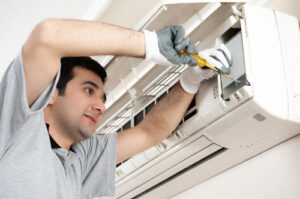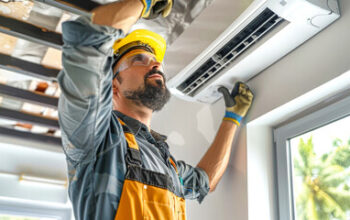If you have an HVAC system at your home, it is vital to schedule preventative maintenance checks to ensure the unit is operating as efficiently as possible. This maintenance is vital to prolonging the life of the unit and ensuring that it functions as it should throughout its lifetime. Whether you are using an older model or a brand new one, preventative maintenance checks will ensure that your system is functioning at its optimal efficiency throughout its lifespan.
One of the most important preventative maintenance checks for AC repair is checking the thermostat to ensure it is working correctly. This is vital in ensuring that the temperature of the unit remains consistent and comfortable. It is also important to check the drainage system to ensure that the water drains away effectively. If the drain line is clogged or has any plugs, it should be cleaned and tightened.
In addition to performing preventative maintenance, regular AC maintenance can help you save money on energy costs and increase the cooling capacity of your air conditioner. Regular cleaning of the indoor coil and air filters will improve the efficiency of the cooling system. To clean the filters, use a kitchen antiseptic spray and rinse them thoroughly. Dust and debris can block airflow and cause a clogged system. Additionally, you should clean the outdoor coil as well. After cleaning it, check that air is flowing properly through your system.
A comprehensive preventative maintenance check of your HVAC unit will help you avoid unexpected repairs. It will also help your unit operate at its maximum efficiency all year round. By scheduling preventative maintenance visits twice a year, you can rest assured that your unit will be running at its optimal performance and will not break down when you need it the most.
Regular maintenance will also improve the efficiency of your HVAC system. If you are able to do it yourself, you can save money on energy bills by ensuring your HVAC system is in good condition. By scheduling preventative maintenance checks regularly, you can guarantee your system will be trouble-free for many years to come. With these preventative maintenance checks, you can also enjoy a 15% discount on your repair bills.
If your air conditioning system isn’t blowing air or making a sound, there are several possible causes. The breaker might be tripped or a fuse blown. If you’re not sure how to troubleshoot this issue, call an expert. If you can’t figure out the problem on your own, call a certified AC repair technician.
You can also check the thermostat. It may be set to heat instead of cooling, or it may be on auto mode. Changing the thermostat will make the system automatically switch between heating and cooling. If the fan doesn’t turn off, you can either set it to “auto” or “on.” If you leave it “on” all the time, it will keep on running even if the system is not cooling.
Another common AC problem is a dirty air filter. When a filter is full, it restricts airflow and can cause a component to malfunction. Replace your filter whenever it becomes dirty. This easy step often resolves the problem. Changing your air filter will help your air conditioner run more efficiently.
You should also check that the thermostat has sufficient battery power. If it is not, clean the thermostat and its battery to ensure that it has the proper signaling. If these measures fail to solve the problem, call an AC repair professional. Lastly, make sure the compressor on your outside condensing unit is running, and the fan is blowing air.
The AC fan is an important part of the HVAC system, and it blows air over the condenser and evaporator coils. If it isn’t working, it may be the cause of the noise. In some cases, the fan may need to be moved or replaced, and it may also need to be lubricated.
Your air conditioning unit may be faulty because the coil is dirty or has leaks. Another common reason for your AC to stop working is that you have a faulty run capacitor or compressor. It’s best to call an AC repair professional immediately if you suspect one of these issues. Always remember that you should never attempt to troubleshoot electrical issues yourself. It’s important to call a professional to avoid any further damage.

